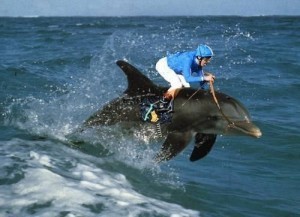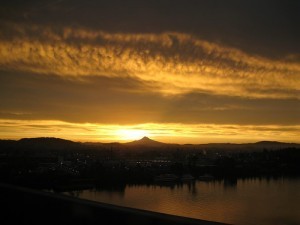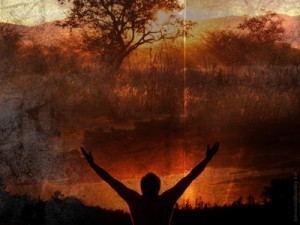Donald Miller's Blog, page 114
November 1, 2011
The Roads
 Stretched before us is an endless system of interstates, highways, and back roads, a trail system of sorts, connecting city to city and state to state, Home Depot to Starbucks. Every intersection passed is an artery leading to workplaces, schools, and homes. Small towns dot the interstate for more than fifty miles north of Houston. Each city its own world; high school football games, church picnics, and Boy Scout meetings keep lives moving in a comfortable rhythm. Tonight they are but clusters of streetlights strung from neighborhood to neighborhood. Each neighborhood with its homes, each home with its family, and each quiet soul sleeping one thin wall from another. Charles Dickens tells us every heart is a profound mystery to the heart beating nearest it, and I am starting to understand him. Watching the dark towns pass gives them a new significance. During the day the roads are clustered with cars at stoplights, but tonight the thick, dark lines simply separate one neighborhood from another, one socioeconomic group from the one it once was. And it is odd for me to consider the thousands of sleeping people, quiet in their homes, their clocks ticking on the walls, the dogs breathing at the feet of their masters' beds, and to realize there are seven billion people living in seven billion settings. These homes house families we don't know. So many sleeping people, all of them spirit, bound by flesh, held up by bone and trapped in time.
Stretched before us is an endless system of interstates, highways, and back roads, a trail system of sorts, connecting city to city and state to state, Home Depot to Starbucks. Every intersection passed is an artery leading to workplaces, schools, and homes. Small towns dot the interstate for more than fifty miles north of Houston. Each city its own world; high school football games, church picnics, and Boy Scout meetings keep lives moving in a comfortable rhythm. Tonight they are but clusters of streetlights strung from neighborhood to neighborhood. Each neighborhood with its homes, each home with its family, and each quiet soul sleeping one thin wall from another. Charles Dickens tells us every heart is a profound mystery to the heart beating nearest it, and I am starting to understand him. Watching the dark towns pass gives them a new significance. During the day the roads are clustered with cars at stoplights, but tonight the thick, dark lines simply separate one neighborhood from another, one socioeconomic group from the one it once was. And it is odd for me to consider the thousands of sleeping people, quiet in their homes, their clocks ticking on the walls, the dogs breathing at the feet of their masters' beds, and to realize there are seven billion people living in seven billion settings. These homes house families we don't know. So many sleeping people, all of them spirit, bound by flesh, held up by bone and trapped in time.
Rarely do I question the mystery of it all. We are atoms connected to create big, awkward, intelligent animals, animals complex in construction, equipped with minds, hearts, and the like. Spinning secretly around us is an intricate system of interconnected physical laws, completely dependent upon one another for effectiveness. And we are in the middle of it; actors on Shakespeare's stage, madmen in Nietzsche's streets, accidents in Sagan's universe, children in God's creation.
This passage is an excerpt from Through Painted Deserts.
The Roads is a post from: Donald Miller's Blog
October 31, 2011
God is Like a Person

It makes sense at the end. I promise.
I believe people change, and I believe life can get better. I have changed, slowly and with time, the way a tree grows by a river. I have a very intelligent and conservative friend who teaches at a local Bible college, and he believes the only thing that truly changes a person is God's truth, that is, His Word and His working in our lives through the Holy Spirit. This makes a lot of sense to me, because the times in my life when I have been most happy haven't been the times when I've had the most money or the most freedom or the most anything, but rather when I've been in love or in community or right with people.
My friend at the Bible college believes the qualities that improve a person's life are relational, relational to God and to the folks around us. This made a lot of sense, too, because when Jesus was walking around on earth He taught His disciples truths through experience, first telling them stories, then walking with them, then causing stuff to happen like a storm on the sea, then reiterating the idea He had taught them the day before. Even then it took years before the disciples understood, and even then the Holy Spirit had to come and wrap things up. So it made me realize that either God didn't know about the formulas, or the formulas weren't able to change a person's heart.
To be honest, though, I don't know how much I like the idea of my spirituality being relational. I suppose I believe it is true, but the formulas seem much better than God because the formulas offer control; and God, well, He is like a person, and people, as we all know, are complicated. The trouble with people is they do not always do what you tell them to do. Try it with your kids or your spouse or strangers at the grocery store, and you will see what I mean. The formulas propose that if you do this and this and this, God will respond. When I was a kid I wanted a dolphin for the same reason.
This passage was an excerpt from Searching for God Knows What.
God is Like a Person is a post from: Donald Miller's Blog
October 30, 2011
Sunday Morning Music: Menomena
Don is off on some super awesome adventure right now, so he asked me to fill in on Sunday Morning Music.
Menomena is a band from Portland, Oregon. And I mean really from Portland, since they all grew up there. The Blue Like Jazz movie was scored by their drummer, Danny Seim, so it features many of their songs. If you've seen the film's trailer, you're already familiar with "Muscle 'n' Flo".
They are also, for my money, the best band in America right now. I realize maybe they're not for everyone, but they should be, doggone it. Here's "Rotten Hell" and "Tithe" off Menomena's last two albums.
Sunday Morning Music: Menomena is a post from: Donald Miller's Blog
October 27, 2011
Update on Blue Like Jazz the Movie
It was just about a year ago we started filming Blue Like Jazz the movie, and since then we've been feverishly editing the film, adding a soundtrack and test screening the film.
At first, the movie ran for nearly two hours, but not we've got it down to 97 minutes and the movie, in my "objective" opinion, is singing. Seriously, it's getting great reviews, and this is without color correction or sound editing, two factors that take a movie over the top.
So far, we are getting about 45% of the audiences saying the movie was excellent, about 49% saying it's "very good" and the rest liked it a little less. Out of the thousands who have screened it so far, only 6 people rated the movie as "poor." Of course, that's going to happen no matter what we do, but we are still making the movie even stronger and by the time it hits theaters I think people are going to be pleasantly surprised.
The number one comment we get when we screen the film is "finally." And by that they mean "finally a film that talks about faith that feels normal, not preachy, not heavy on agenda but heavy on meaning, cinematically beautiful and disarmingly honest." Those are all from the notes we've received on our surveys.
As many of you know, this movie was funded by nearly 4500 backers on a website called Kickstarter. Since then, other investors have joined us and are still joining us on a much larger scale to get this movie released in theaters. That said, amazingly, our director, Steve Taylor has called more than 3000 of the backers and thanked them personally, and intends to call each of you before the film hits theaters. I've called hundreds myself and every conversation gives me the same sense of gratitude that we had when we first started filming. This movie was truly made with passion and creativity and mostly love.
If all goes according to plan, the movie will release on April 13 of 2012.
Here's an interview Steve did recently at a National Youth Workers Convention with Tic Long.
Update on Blue Like Jazz the Movie is a post from: Donald Miller's Blog
October 26, 2011
The Desert Mothers Didn't Change Diapers. But Maybe They Should Have.
 Penny Carothers is a mom and the Social Justice Editor at the Burnside Writers Collective. You can find her on Twitter, her blog, or more often, on the floor playing with legos. You may also remember her as Penny from Blue Like Jazz, except she's even more awesome in person.
Penny Carothers is a mom and the Social Justice Editor at the Burnside Writers Collective. You can find her on Twitter, her blog, or more often, on the floor playing with legos. You may also remember her as Penny from Blue Like Jazz, except she's even more awesome in person.
I guess I'm not postmodern enough to have read the Desert Mothers, but once upon a time I was into the mystics. Years ago, when reading about Juliann of Norwich, I had an intense desire to, like her, have a room built around me – which I could never leave – so I could devote myself to the meditative life. (Ha! Excuse me while I laugh myself silly.) That life – and sometimes it seems my whole goll-darn spiritual life – is ancient history. 'Cuz I have kids now.
I've got two, which means I can't spend days in a cave or hours on my knees. Something about the mental and physical exhaustion of child-rearing makes even the leanest spiritual practice a near impossibility. The proffered solutions are laughable, even ridiculous. Get up earlier to read the Bible. Seriously? Is that a joke? Find space in the small moments of each day? I might feel guilty about it sometimes, but I'd rather wrangle some control over my house and my self lest I turn into the baby food-wearing, greasy-haired, haggard mommy I am but a few small steps ahead of becoming.
I often think there must be something wrong with me, because drinking coffee and brushing my teeth usually takes precedent over reading the Bible. I berate myself, saying that if I really cared about my spiritual life I would make the necessary sacrifices. I had almost convinced myself of this when a friend suggested Bonnie Miller-McLemore's book, In the Midst of Chaos: Caring for Children as Spiritual Practice. Miller-McLemore* rejects the notion you must say goodbye to a vibrant spiritual life when you become a parent. She challenges us to get rid of the belief that the sacred is found only in certain rituals, practices, and places, noting that Protestants have forgotten about the sanctification of the ordinary.
In perhaps my favorite paragraph in the book, Miller-McLemore quotes medievalist scholar Elizabeth Dreyer. Parenting, Dreyer says, "is the 'ascetic opportunity' par excellence….A full night's sleep, time to oneself, the freedom to come and go as one pleases – all this must be given up." The sacrifice of parenting is a no-brainer, but I have to admit: it leaves me feeling a little defeated. This whiney, poopy, chaotic quotidian life is the field in which our spirituality grows and matures? There's not some glorious mountaintop waiting for me?
I've always elevated the lives of others above my own spiritual aspirations (especially people like Thomas Merton and Juliann of Norwich, and really, anybody who seems to have a rule of life that brings the spiritual into the everyday). This mistaken belief parallels my long-held view that spirituality has to look a certain way to be legit. Being the good girl that I am, I want to do it right: have daily quiet time, read the Bible every day, and (at least try to) pray without ceasing.
But Miller-McLemore has got me thinking: what if there really is a different way? What if God intended the hug of a child to mirror the numinous moment others achieve through meditation? What if attending to the needs and the play of children – really attending, not reading the news on my phone or folding laundry while I listen with half an ear – was a window into the spiritual? What if all I really needed to do was simply be present? After all, God calls himself a lover and a parent, and perhaps there is something to learn in embracing my life rather than trying to escape it so I can have real communion with God.
It's still a little shocking, but perhaps the most spiritual thing I can do may be to embrace my life as a mother. Not a spiritual, metaphorical mother, but a snot-wiping, baby-chasing, diaper bag-toting mother. Because sometimes it's not the bible stories or the lectio divina, but the Help! and thank you that a relationship is built on.
—
*I know she's a feminist and all, but that combination of names really is a mouthful.
The Desert Mothers Didn't Change Diapers. But Maybe They Should Have. is a post from: Donald Miller's Blog
October 25, 2011
One Story Alone
 Here is something I found to be true: you don't start processing death until you turn thirty. I live in visions, for instance, and they are cast out some fifty years, and just now, just last year I realized my visions were cast too far, they were out beyond my life span. It frightened me to think of it, that I passed up an early marriage or children to write these silly books, that I bought the lie that the academic life had to be separate from relational experience, as though God only wanted us to learn cognitive ideas, as if the heart of a man were only created to resonate with movies. No, life cannot be understood flat on a page. It has to be lived; a person has to get out of his head, has to fall in love, has to memorize poems, has to jump off bridges into rivers, has to stand in an empty desert and whisper sonnets under his breath:
Here is something I found to be true: you don't start processing death until you turn thirty. I live in visions, for instance, and they are cast out some fifty years, and just now, just last year I realized my visions were cast too far, they were out beyond my life span. It frightened me to think of it, that I passed up an early marriage or children to write these silly books, that I bought the lie that the academic life had to be separate from relational experience, as though God only wanted us to learn cognitive ideas, as if the heart of a man were only created to resonate with movies. No, life cannot be understood flat on a page. It has to be lived; a person has to get out of his head, has to fall in love, has to memorize poems, has to jump off bridges into rivers, has to stand in an empty desert and whisper sonnets under his breath:
I'll tell you how the sun rose
A ribbon at a time . . .
It's a living book, this life; it folds out in a million settings, cast with a billion beautiful characters, and it is almost over for you. It doesn't matter how old you are; it is coming to a close quickly, and soon the credits will roll and all your friends will fold out of your funeral and drive back to their homes in cold and still and silence. And they will make a fire and pour some wine and think about how you once were . . . and feel a kind of sickness at the idea you never again will be.
So soon you will be in that part of the book where you are holding the bulk of the pages in your left hand, and only a thin wisp of the story in your right. You will know by the page count, not by the narrative, that the Author is wrapping things up. You begin to mourn its ending, and want to pace yourself slowly toward its closure, knowing the last lines will speak of something beautiful, of the end of something long and earned, and you hope the thing closes out like last breaths, like whispers about how much and who the characters have come to love, and how authentic the sentiments feel when they have earned a hundred pages of qualification.
And so my prayer is that your story will have involved some leaving and some coming home, some summer and some winter, some roses blooming out like children in a play. My hope is your story will be about changing, about getting something beautiful born inside of you, about learning to love a woman or a man, about learning to love a child, about moving yourself around water, around mountains, around friends, about learning to love others more than we love ourselves, about learning oneness as a way of understanding God. We get one story, you and I, and one story alone. God has established the elements, the setting and the climax and the resolution. It would be a crime not to venture out, wouldn't it?
It might be time for you to go. It might be time to change, to shine out.
I want to repeat one word for you:
Leave.
Roll the word around on your tongue for a bit. It is a beautiful word, isn't it? So strong and forceful, the way you have always wanted to be. And you will not be alone. You have never been alone. Don't worry. Everything will still be here when you get back. It is you who will have changed.
This passage was an excerpt from Through Painted Deserts.
One Story Alone is a post from: Donald Miller's Blog
October 24, 2011
A Mysterious, Indefinable, Relational Interaction
 Through a dark night of the soul, I came to realize salvation happens through a mysterious, indefinable, relational interaction with Jesus in which we become one with Him. I realized Christian conversion worked more like falling in love than understanding a series of concepts or ideas. This is not to say there are no true ideas, it is only to say there is something else, something beyond. There are true ideas involved in marriage and sex, but marriage and sex also involve something else, and that something else is mysterious.
Through a dark night of the soul, I came to realize salvation happens through a mysterious, indefinable, relational interaction with Jesus in which we become one with Him. I realized Christian conversion worked more like falling in love than understanding a series of concepts or ideas. This is not to say there are no true ideas, it is only to say there is something else, something beyond. There are true ideas involved in marriage and sex, but marriage and sex also involve something else, and that something else is mysterious.
If we have a controlling personality, in which we like to check things off of lists, this is going to be extremely hard for us to understand and embrace. God gives us no control, really, over this "system" of relationship. Introducing somebody to Jesus is not about presenting ideas, then, as much as it is introducing a person to a Deity who lives and interacts. Evangelism, then, looks like setting somebody up on a blind date: God does the work, we just tell them about Him and where they can find Him.
You might be getting upset by this. You might think I am saying truth should be thrown out, that theology doesn't matter. But this is not what I'm saying at all. What I'm intending to illustrate is that our drive to define God with a mathematical theology has become a false God rather than an arrow that points to the real God. Theology can become an idol, but it is more useful as guardrails on a road to the true God. Theology is very important, but it is not God, and knowing facts about God is not the same as knowing God. Let me give you an extreme example of how very bad we have gotten about this in the West.
About the time I was thinking through these things, I was teaching a class in Canada, and my students were freshman college students, all of whom had grown up in the church. The class was called "Gospel and Culture". I started the class with an experiment. I told the class I was going to share the gospel of Jesus, but I was going to leave something out. I wanted them to figure out what I'd left out. I talked first about sin, about how we are fallen creatures. I told some stories and used some illustrations. I talked about repentance, and again told some stories, then I talked about God's forgiveness, and I talked about heaven. I went on for some time. And when I finally stopped and asked the class to tell me what I left out. After twenty or more minutes of discussion, not one student realized I'd left out Jesus. Not one. And I believe I could repeat that same experiment in Christian classrooms across North America.
What I came to understand, then, is Christian conversion is relational. It is not theological or intellectual any more than marriage is theological or intellectual. In other words, a child could become a Christian if they had a mysterious encounter with Jesus, and a simple thinker could become a Christian if they had a mysterious encounter with Christ, and even a person who was a Muslim or a Buddhist could become a Christian if they had a mysterious relational encounter with Christ. This is the only answer at which I could arrive that matched the reality in which we live, the complexity of Scripture, and the mysterious invitation offered to us by Jesus.
This passage was an excerpt from Searching for God Knows What.
A Mysterious, Indefinable, Relational Interaction is a post from: Donald Miller's Blog
October 21, 2011
Remembering Elliott Smith
It was today, eight years ago, that Elliott Smith passed. He was a Nebraskan kid, transplanted to Texas before finding his adult and creative home here in Portland. He rose to acclaim when creator Gus VanSant found him in a club, and used several of his songs on the Good Will Hunting Soundtrack. We all loved Miss Misery. Born Paul Smith to his mother Bunny Welch, Smith would become one of contemporary musics greatest creators. The end of his life was tragic, giving himself to drugs, then believing Dreamworks was out to get him in a white van. He died of suicide. Remembering Elliot Smith:
Remembering Elliott Smith is a post from: Donald Miller's Blog
October 20, 2011
The Most Unexplored Cosmos
I heard a documentarian say the oceans were the most unexplored known territory, even more so than space. He said we know less about the deeps than we do the heights, and I suppose we could debate his point. He was no doubt trying to peak our interest and raise more money for more documentaries, more time in a submarine. Who can blame him.
[image error]We do know a lot about space, and we are learning more about the oceans, but I don't think either of these territories are the least explored. I still think the least explored territory is humanity, both collective and individual. It's not physical territory, I know, but where is there more fearful darkness or illuminating beauty than in the depths of the person sitting next to you on a bus? Where is there more evil and more beauty than in the unexplored cosmos of a human being?
I wonder if you might take a walk tonight after dinner with your daughter or your son, or your wife or your neighbor, and take the submarines down for a dive. Who are they? What do they love? What are they afraid of? Do they understand their own power? Do they know that somebody is after their beauty? And that they have beauty in the first place? Do they know they are worth exploring?
The Most Unexplored Cosmos is a post from: Donald Miller's Blog
October 19, 2011
Parentocracy
 The following is the first in a series of guest posts. Jason Boyett is the author of O Me of Little Faith and the Pocket Guide series of books. Find him at Dadequate, Twitter, Facebook, and at jasonboyett.com.
The following is the first in a series of guest posts. Jason Boyett is the author of O Me of Little Faith and the Pocket Guide series of books. Find him at Dadequate, Twitter, Facebook, and at jasonboyett.com.
There's a hot new website — they still make those, you know — called Fitocracy. It's a site for tracking your day-to-day fitness achievements. How many push-ups did you do? How fast did you run that 5K? How long were you on the elliptical? You log in your workouts, it assigns points based on your exercises' degree of difficulty, and you watch the points accumulate. Once you reach a certain number of points, you move up a level. You unlock achievement badges. And because it's as much a social media site as anything else, your friends and followers get to see how well (or poorly) you're doing.
The guys who started it, Brian Wang and Richard Talens, grew up playing video games. They knew how addictive gaming could be. What if the pleasures of gaming — new levels, new achievements, a flurry of points — could be applied to exercise? After all, exercise isn't always fun. You don't always see immediate changes in your body. There are no power-up noises that ding when you meet a goal. In an activity where "real" results are hard to see, Fitocracy creates them and gives them to you as soon as you log a workout. It's pretty brilliant.
So brilliant, in fact, that I keep trying to think of other hard-to-quantify activities that could benefit from the same approach. Sure, we need to be healthier. But what else could we improve? I write a blog about fatherhood. What if we could inject the immediate returns of gaming into the long-haul experience of being a good dad?
Log your activities, dads:
+100 points for jumping on the trampoline with your kids
+200 points for playing Barbies with your daughter, even if you have no idea what you're supposed to do or say
+175 points for participating in a living-room dance party (50 bonus points if the music is by The Wiggles)
+150 points for each story you tell at night before bed (add 50 if you made up the story yourself)
+75 points for each game of H-O-R-S-E you play in the driveway (add 50 if you purposefully lose)
+25 points per diaper changed, bottle given, and post-feeding burp achieved
+10 per high five or fist bump given
+500 points for talking to your kid about sex before he figures it out from his friends
+500 points for coaching your kid's sports team
+500 points every time one of your kids is kind to someone else because he's seen you treat people that way
Those points could add up. You'd see average fathers unlocking achievements — Super Dad, Not-Entirely-Lame Dad, Sporty Dad – on a weekly basis. We'll call it "Parentocracy" and get moms involved, too. (They would earn points so fast they'd need special secret levels.)
Could Parentocracy be a way to get dads home from work faster, or off their recliners, or away from their smartphones? Could it be a way to make them more active and present in their kids' lives?
The sad thing is: probably so. Sometimes you have to dangle a few carrots in front of us to get us to do the right thing. (As if our kids' futures aren't enough carrot already.)
So there's the idea, Internet geniuses and coding nerds. Get to work.
Parentocracy is a post from: Donald Miller's Blog
Donald Miller's Blog
- Donald Miller's profile
- 2745 followers



